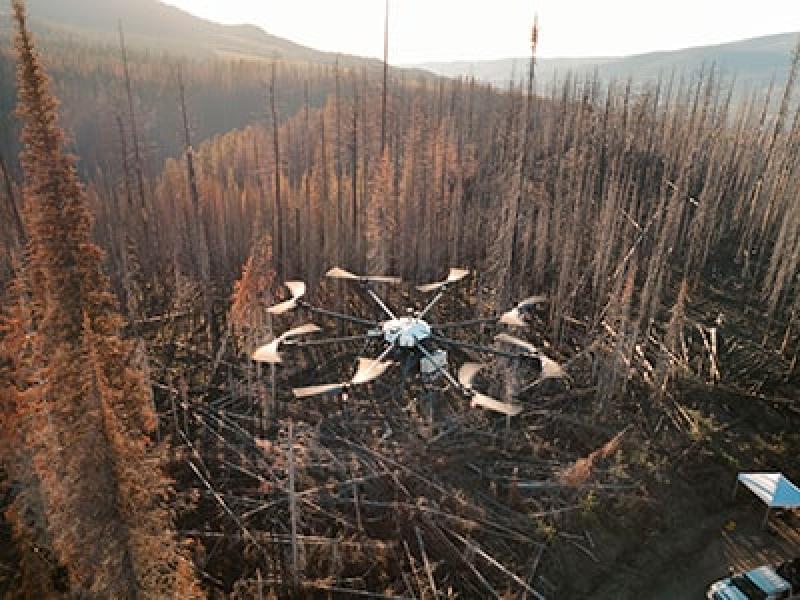
The Telus Pollinator Fund for Good has launched its second annual impact report, detailing nearly $40 million in investments which have almost doubled its portfolio to 26 start-ups.
It has also generated a 155 per cent increase in revenue growth for the companies involved.
The near-$40 million is part of the fund’s initial planned $100 million investment since its 2020 launch.
One of those companies is the Mississauga-based Flash Forest, which Telus and OurCrowd co-led in its $11.4 million Series A funding round in April. Founded in 2019 via Kickstarter, Flash Forest uses drones and artificial intelligence to reforest areas damaged by wildfires.
“We have, broadly speaking, four investment pillars and they guide where we seek investments and those are: caring for our environments, supporting responsible agriculture, transforming health care and building more sustainable communities. Think of them as large areas where we seek or pursue deal flow and look to identify opportunities to invest,” Blair Miller, the fund’s managing partner, told SustainableBiz.
“Then from a stage perspective, we invest on the early side, what could be catalytic in terms of the support of the next generation of sustainable and responsible businesses, founders, entrepreneurs.”
The fund was awarded at Foresight Canada’s 2023 BC Cleantech Awards as Funder of the Year, and was named a finalist for Fast Company’s World Changing Ideas Awards for Social Impact Investing.
The Telus Pollinator Fund
Sixty-two per cent of the fund’s portfolio is based in Canada. While the fund is biased toward supporting Canadian companies, it is “globally opportunistic.”
“(In) any of the four areas that I identified, we're always looking to source new deals, to drum up new business in those categories and constantly have discussions underway,” Miller said.
“Many are early stages just trying to qualify, do initial sort of outreach and deal screening, where we're looking at market opportunities, traction, understanding the company's thesis, the impact . . . in what they're looking to do, and so there's just many, many conversations that are at an early stage.”
Some of the other agriculture-focused companies in which the fund invested include Nectar, a Montreal-based start-up that offers digital tools for beekeepers to facilitate hive tracking and improve bee health management practices.
The report states Nectar has almost tripled its hives under management since the fund’s 2021 investment, impacting over 22 million hectares across Canada and the U.S.
There is also Fresh City Farms, which runs Toronto’s largest urban farm in Downsview Park, and Goodr, an Atlanta-based logistics platform that redistributes edible excess food to communities in need.
Aside from Flash Forest, some of the sustainability-focused investments include Bolingbrook, Ill.-based Mycocycle, which uses lab-cultivated mushrooms to break down shredded waste materials.
This year, the fund also launched the online Pollinator Impact Navigation Tool, designed to help early-stage companies measure impacts across various frameworks.
Looking ahead with the fund
While the fund still has $60 million of its initial investment to spend, there’s no upper limit on spending in the years to come. There are also no timeline targets for the investments.
“We certainly have directional targets, in terms of investments and dollars that we put into market, but those are also a function of the opportunities identified and in the broader state of the market,” Miller said.
“I would characterize (the venture space) as slower than 2022. So it's a tougher investment climate right now. But we're continuing to seek to identify really compelling opportunities across our investment pillars and notably looking for solutions in the climate space and sustainable agriculture space.”
Miller explained that follow-up support for companies would come on a case-by-case basis. Ideally, the fund sees these companies grow beyond its ability to support them.
However, in certain cases, support doesn’t have to be strictly through funding. Flash Forest also entered into a multi-year commercial agreement with Telus' sustainability and environment team to provide up to 12.1 million drone-planted trees for Telus customers by the end of 2025.
It is also working with Flash Forest on solutions involving Telus’ 5G technology.
“Finding those opportunities, linking the strategic assets or bench strength at the Telus team to help accelerate the growth of our portfolio companies, is a way that we think we can be more than just a check-in deal and help amplify the impact outcomes that these companies can achieve,” Miller said.
Bryce Jones, Flash Forest’s CEO and co-founder, previously told SustainableBiz the company would likely renew that contract.










